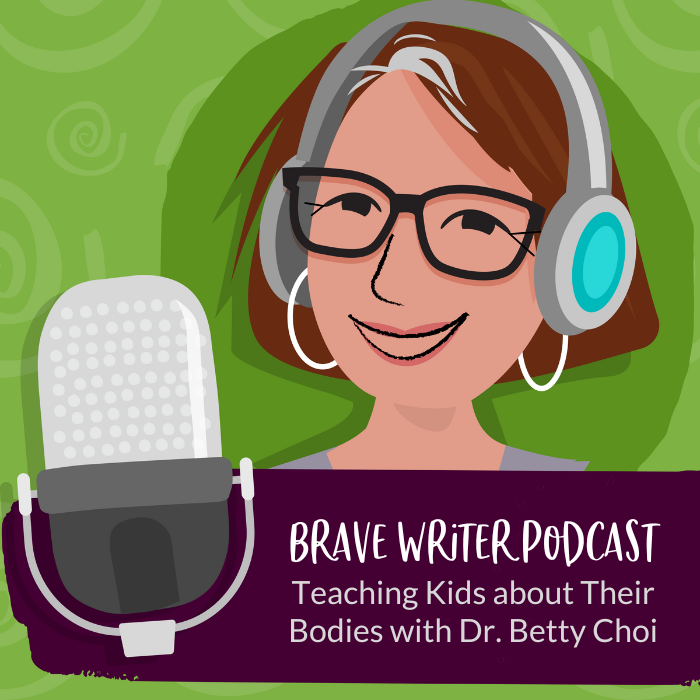Podcast: Bonus Episode! Teaching Kids about Their Bodies with Dr. Betty Choi

Kids are naturally, wonderfully curious — especially when it comes to their own bodies. It isn’t easy to answer curious kids’ questions about their bodies with accuracy and to their satisfaction.
That’s where the book Human Body Learning Lab by Dr. Betty Choi comes in. The author, a Harvard-educated pediatrician, shares her passion for helping children understand their bodies and satisfy their curiosity.
Join us on the Brave Writer podcast for a fascinating conversation with Dr. Choi on how to create opportunities for kids to get to know their own bodies.
Show Notes
Dr. Betty Choi wrote Human Body Learning Lab with the goal of providing children with a hands-on, interactive learning experience about the human body. She wanted to create a resource that was not limited to just two-dimensional words on a page but incorporated hands-on activities. Additionally, she wanted to include a diverse range of images in the book, reflective of real-life anatomy, to provide a more accurate representation of people’s physical appearance both on the outside and inside.
Parenting through empowerment
One of the examples Dr. Choi uses in her book is teaching children about the immune system and the benefits that come along with doing so. Imposing a belief about germs on children without providing a deeper understanding can lead to an authoritative parenting style. Instead of just telling a child to wash their hands, it’s much more effective to explain the reasons behind the behavior, such as protection from germs and potential dangers from food allergies. This understanding can motivate children to make informed decisions and develop healthy habits.
Dr. Betty Choi recommends an experiment that she suggests doing with kids to demonstrate the power of soap in fighting germs. The experiment requires water, black pepper, dish soap, and a bowl. The first step is to put water and black pepper in the bowl and then stick your finger in it. Nothing significant happens. Then, the experiment is repeated by putting a tiny bit of dish soap on the fingertip and then sticking the finger just a little bit at the top of the water. The experiment is intended to show the kids how soap can scatter away the black pepper flakes, which are meant to represent germs, and highlight the power of soap. She’s performed this experiment with preschoolers and even older kids and teens and the reaction has been fascinating.
The fine balance in discussing reproductive parts
Human Body Learning Lab contains a chapter on the reproductive system. This chapter may evoke strong emotions for some parents who feel uncomfortable discussing sexuality with their children. However, Dr. Choi’s intent was to normalize this conversation, just as we would talk about other body systems such as the digestive system. These conversations are essential for the health and safety of our children, as it protects them from potential abuse and ensures they receive accurate information.
If children do not receive this information from safe resources, they will find it elsewhere — the internet is just a tap away, after all. So it is important for parents to provide a solid foundation of information to their children.
How to teach kids to talk about their bodies
As a parent, it’s important to teach kids about their bodies and how to take care of them. One approach is to talk about hunger and listen to what the body is telling us. For example, ask your child if their stomach is growling or if they feel full. This helps the child be in touch with their body and its signals.
In addition, there are three different thinking exercises to help kids understand their bodies better:
Physical Body: Teach kids to listen to their body’s cues and to observe what might be getting in the way, such as TV or music in the background. Ask questions like how do you know when you’re cold, tired, or thirsty and let the child observe the physical sensations in their body.
Emotional Health: Discuss emotions and how they affect the body. For example, ask how the child knows they’re nervous or excited, and have them notice physical sensations like heart rate, muscle tension, or sweating. You can also model how you know when you’re upset or stressed.
Actions: Teach kids to think critically about why we do the things we do, like washing our hands. Ask questions like why do you think we wear clothes or why is it important to brush our teeth. Encourage kids to think about their actions and not just do them out of habit.
By engaging kids in these exercises, they can learn to be mindful of their bodies and emotions and make healthy choices.
This is just scratching the surface of the myriad lessons Dr. Betty Choi has in Human Body Learning Lab. If you’re struggling to broach the topic of talking about body parts — especially those tricky, private ones — then this is an invaluable resource to make these discussions fun, engaging, and informative for each of you.
Resources
- Dr. Choi’s website: https://drbettychoi.com/
- Human Body Learning Lab: https://drbettychoi.com/human-body-learning-lab-book/
- Get 10% off our Growing Brave Writers program using code GBWPOD10 at https://store.bravewriter.com/products/growing-brave-writers
- Sign up for our Text Message Pod Ring to get podcast updates and more!
- Want help getting started with Brave Writer? Head over to bravewriter.com/getting-started
- Sign up for the Brave Writer newsletter to learn about all of the special offers we’re doing in 2022 and you’ll get a free seven-day Writing Blitz guide just for signing up: http://go.bravewriter.com/writing-blitz
Connect with Julie
- Instagram: instagram.com/juliebravewriter
- Twitter: twitter.com/bravewriter
- Facebook: facebook.com/bravewriter



















